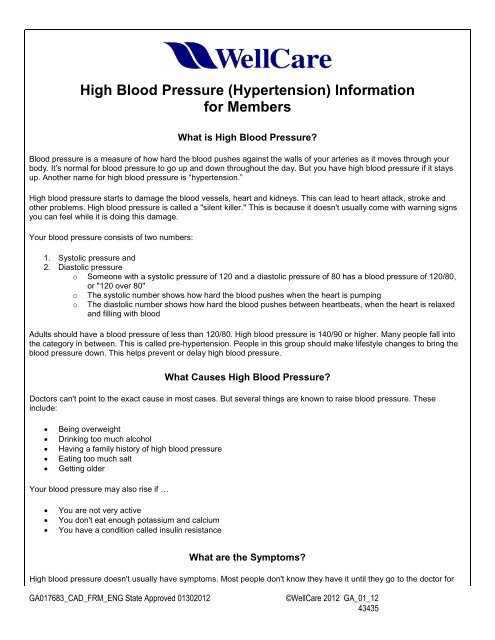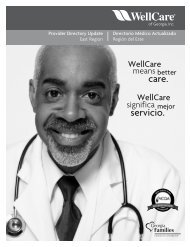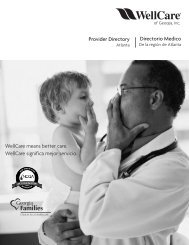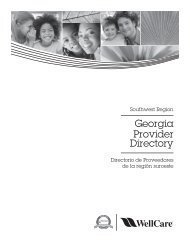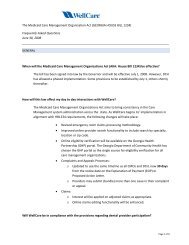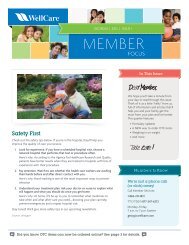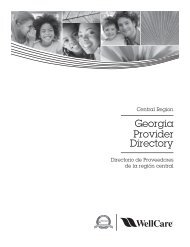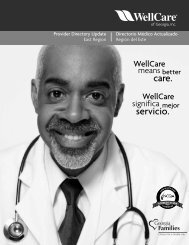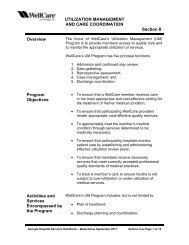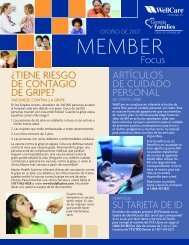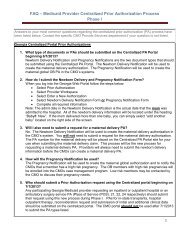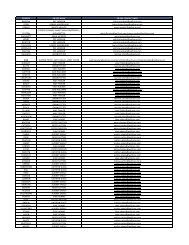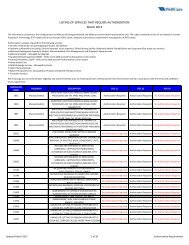High Blood Pressure - WellCare
High Blood Pressure - WellCare
High Blood Pressure - WellCare
You also want an ePaper? Increase the reach of your titles
YUMPU automatically turns print PDFs into web optimized ePapers that Google loves.
<strong>High</strong> <strong>Blood</strong> <strong>Pressure</strong> (Hypertension) Information<br />
for Members<br />
What is <strong>High</strong> <strong>Blood</strong> <strong>Pressure</strong>?<br />
<strong>Blood</strong> pressure is a measure of how hard the blood pushes against the walls of your arteries as it moves through your<br />
body. It’s normal for blood pressure to go up and down throughout the day. But you have high blood pressure if it stays<br />
up. Another name for high blood pressure is “hypertension.”<br />
<strong>High</strong> blood pressure starts to damage the blood vessels, heart and kidneys. This can lead to heart attack, stroke and<br />
other problems. <strong>High</strong> blood pressure is called a "silent killer.'' This is because it doesn't usually come with warning signs<br />
you can feel while it is doing this damage.<br />
Your blood pressure consists of two numbers:<br />
1. Systolic pressure and<br />
2. Diastolic pressure<br />
o Someone with a systolic pressure of 120 and a diastolic pressure of 80 has a blood pressure of 120/80,<br />
or "120 over 80"<br />
o The systolic number shows how hard the blood pushes when the heart is pumping<br />
o The diastolic number shows how hard the blood pushes between heartbeats, when the heart is relaxed<br />
and filling with blood<br />
Adults should have a blood pressure of less than 120/80. <strong>High</strong> blood pressure is 140/90 or higher. Many people fall into<br />
the category in between. This is called pre-hypertension. People in this group should make lifestyle changes to bring the<br />
blood pressure down. This helps prevent or delay high blood pressure.<br />
What Causes <strong>High</strong> <strong>Blood</strong> <strong>Pressure</strong>?<br />
Doctors can't point to the exact cause in most cases. But several things are known to raise blood pressure. These<br />
include:<br />
Being overweight<br />
Drinking too much alcohol<br />
Having a family history of high blood pressure<br />
Eating too much salt<br />
Getting older<br />
Your blood pressure may also rise if …<br />
You are not very active<br />
You don't eat enough potassium and calcium<br />
You have a condition called insulin resistance<br />
What are the Symptoms?<br />
<strong>High</strong> blood pressure doesn't usually have symptoms. Most people don't know they have it until they go to the doctor for<br />
GA017683_CAD_FRM_ENG State Approved 01302012 ©<strong>WellCare</strong> 2012 GA_01_12<br />
43435
some other reason. Without treatment, high blood pressure can damage the …<br />
Heart<br />
Brain<br />
Kidneys<br />
Eyes<br />
This damage causes problems like …<br />
Coronary artery disease<br />
Stroke<br />
Kidney failure<br />
Very high blood pressure can cause …<br />
Headaches<br />
Vision problems<br />
Nausea<br />
Vomiting<br />
These symptoms can also be caused by very high blood pressure. This is called several names …<br />
“Malignant high blood pressure”<br />
“Hypertensive crisis”<br />
“Hypertensive emergency”<br />
It is a medical emergency. It should be treated right away.<br />
How is it Diagnosed?<br />
Most people find out they if have high blood pressure during a routine doctor visit. Your doctor will find out if you have<br />
high blood pressure. Your blood pressure must be at least 140/90 three or more times. It is usually measured 1 to 2<br />
weeks apart. You may have to check your blood pressure at home if there is reason to think the readings in the doctor’s<br />
office aren't right. Your blood pressure may go up just because you're at the office. Even routine activities can raise your<br />
blood pressure. These may be things like commuting to work or smoking a cigarette.<br />
Treatment depends on a few things. These include:<br />
How is it Treated?<br />
How high your blood pressure is<br />
Whether you have other health problems such as diabetes<br />
Whether any organs have already been damaged<br />
Your doctor will also consider how likely you are to develop other diseases.<br />
You can help lower your blood pressure. You can do this by making healthy changes to your lifestyle. You may also need<br />
to take pills if those lifestyle changes don't work. Either way, you will need to control your high blood pressure throughout<br />
your life.<br />
If you have pre-hypertension, your doctor will likely recommend lifestyle changes like losing weight, exercising,<br />
limiting alcohol, cutting back on salt, quitting smoking, and eating a low-fat diet that includes more fruits,<br />
vegetables, whole grains, and low-fat dairy foods<br />
If you have high blood pressure without any organ damage or other risk factors for heart disease, your doctor may<br />
recommend that you take medicine in addition to making lifestyle changes<br />
GA017683_CAD_FRM_ENG State Approved 01302012 ©<strong>WellCare</strong> 2012 GA_01_12<br />
43435
If you have high blood pressure and have some organ damage or other risk factors for heart disease, you may<br />
need to try various combinations of medicines in addition to making major lifestyle changes<br />
Most people take more than one pill for high blood pressure. Work with your doctor to find the right pill or combination of<br />
pills that will cause the fewest side effects.<br />
It can be hard to remember to take pills when you have no symptoms. But your blood pressure will go back up if you don't<br />
take your medicine every day. Make your pill schedule as simple as you can. Plan times to take your pills when you are<br />
doing other things, like eating a meal or getting ready for bed.<br />
What Can You Do to Prevent <strong>High</strong> <strong>Blood</strong> <strong>Pressure</strong>?<br />
There are six lifestyle changes you can make to help prevent high blood pressure:<br />
Lose weight<br />
Eat less salt<br />
Exercise<br />
Limit alcohol to 2 drinks a day for men and 1 drink a day for women and lighter-weight men<br />
Get 3,500 mg of potassium in your diet every day. Fresh, unprocessed whole foods have the most potassium.<br />
These foods include meat, fish, nonfat and low-fat dairy products, and many fruits and vegetables.<br />
Follow the DASH eating plan (Dietary Approaches to Stop Hypertension), which is rich in fruits, vegetables and<br />
low-fat dairy products and is low in fat<br />
Parks, R. (2007). <strong>High</strong> blood pressure and heart disease.<br />
References<br />
Retrieved from http://www.cardiologyconsultantspa.com/home/<br />
Legal Disclaimer: Preventive health guidelines are based on information and recommendations of independent third parties available before printing.<br />
These guidelines are not a replacement for your doctor’s medical advice. Your doctor may have more up to date information. Members should always<br />
talk with their doctor(s) about what care and treatment is right for them. The fact that a service or item is in these guidelines is not a guarantee of<br />
coverage or payment. Members should look at their own plan coverage papers to see what is or is not a covered benefit. <strong>WellCare</strong> does not offer<br />
medical advice or provide medical care, and does not guarantee any results or outcomes. <strong>WellCare</strong> does not warrant or guarantee, and shall not be<br />
liable for any information that is in these guidelines or that is not in these guidelines or for any recommendations made by independent third parties from<br />
whom any of the information was obtained.<br />
Original Version: 3/2009. Revised: 12/1/2011<br />
GA017683_CAD_FRM_ENG State Approved 01302012 ©<strong>WellCare</strong> 2012 GA_01_12<br />
43435


